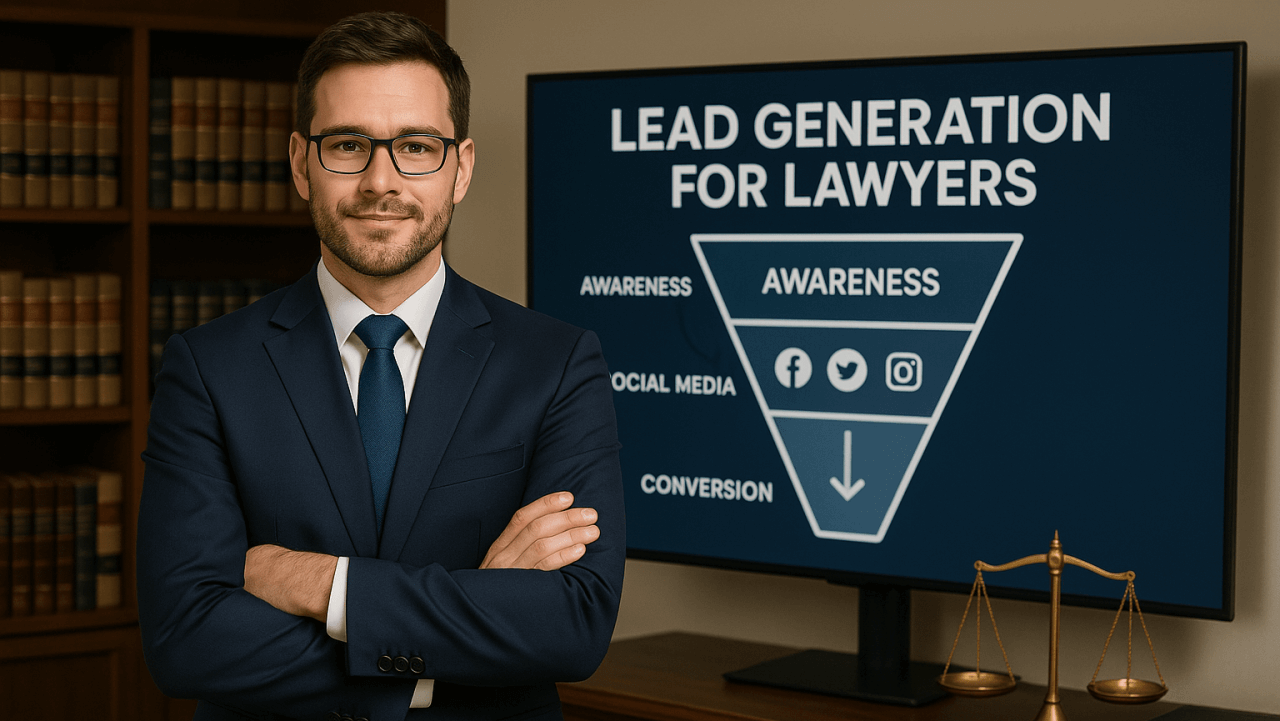- Mon - Fri: 8.30 AM - 5:00 PM
- 26565 Agoura Rd., 200, Calabasas, CA 91302
- 818-884-8075

Lead Generation for Lawyers: How Do Lawyers Generate Leads
How Do Lawyers Generate Leads in a Competitive Legal Market?
How do lawyers generate leads in today’s digital-first legal landscape? The answer lies in combining organic and paid strategies that align with their practice area and audience. In today’s competitive legal industry, lead generation for lawyers is essential for attracting new clients and growing a successful practice. Whether you’re a solo practitioner or part of a large law firm, consistently generating high-quality leads ensures a steady stream of potential clients who need legal representation.
Unlike traditional marketing methods, modern law firm lead generation relies on a mix of digital marketing, networking, and client referrals to reach the right audience. Attorneys must leverage multiple strategies, including SEO, paid advertising, social media, and referral partnerships, to stay ahead of the competition.
This guide explores how attorneys attract clients, covering the best lead generation strategies for lawyers, the cost of acquiring legal leads, and tips for converting prospects into paying clients. By implementing proven lead generation tactics, lawyers can increase visibility, improve client acquisition, and build a thriving practice.
Understanding Lead Generation for Lawyers
What Are Legal Leads and Why Do They Matter?
Legal leads refer to potential clients actively seeking legal representation. These individuals have either expressed interest in hiring a lawyer or are in the process of researching legal solutions. High-quality legal leads are essential for law firms because they directly contribute to client acquisition, case volume, and overall business growth.
For lawyers, effective lead generation means connecting with the right clients at the right time—those who genuinely need legal assistance. Without a solid lead generation strategy, law firms may struggle with inconsistent caseloads and lost revenue opportunities. By generating leads through targeted marketing efforts, attorneys can maintain a steady pipeline of potential clients, ensuring long-term success.
Organic vs. Paid Legal Lead Generation
Lawyers have two primary ways to generate leads: organic (earned) leads and paid leads. Each approach has its advantages, and many law firms use a combination of both to maximize results.
Organic Lead Generation (Long-Term & Cost-Effective)
Organic leads come from non-paid marketing efforts and are typically acquired through content marketing, SEO, social media engagement, and referrals. These leads are high-intent since they are actively searching for legal services and often convert at a higher rate.
Key organic lead generation methods:
- Search Engine Optimization (SEO): Optimizing your law firm’s website to rank on Google for relevant legal queries (e.g., “best personal injury lawyer near me”).
- Content Marketing: Writing blog posts, FAQs, and legal guides to attract and educate potential clients.
- Referral Networks: Building partnerships with other attorneys, professionals, or past clients to receive direct referrals.
- Social Media Engagement: Establishing authority and trust through active participation on LinkedIn, Facebook, and other platforms.
Pros of Organic Lead Generation:
- Cost-effective (minimal ongoing expenses).
- High-intent leads with better conversion rates.
- Builds long-term authority in search engines and legal communities.
Cons of Organic Lead Generation:
- Takes time to see results (SEO efforts may take months to gain traction).
- Requires ongoing content creation to maintain rankings and engagement.
Paid Lead Generation (Fast & Scalable)
Paid legal leads are acquired through advertising campaigns or third-party lead providers. This method delivers instant results and allows firms to scale their client acquisition quickly.
Key paid lead generation methods:
- Pay-Per-Click (PPC) Advertising: Running Google Ads or Bing Ads targeting specific legal services (e.g., “divorce lawyer consultation”).
- Social Media Advertising: Using Facebook, LinkedIn, and Instagram to run targeted legal service ads.
- Buying Leads from Lead Providers: Purchasing pre-screened legal leads from best lead providers for lawyers who specialize in connecting attorneys with potential clients.
Pros of Paid Lead Generation:
- Instant results (ads can generate leads immediately).
- Highly targeted (advertising allows firms to reach specific demographics).
- Scalable (firms can increase ad spend to generate more leads).
Cons of Paid Lead Generation:
- Expensive (highly competitive legal industries may have high PPC costs).
- Lead quality varies (not all purchased leads are pre-qualified or exclusive).
- Ongoing investment required (leads stop coming in when the budget runs out).
Which Lead Generation Strategy Is Best for Lawyers?
The most successful law firms use a hybrid approach, combining organic and paid lead generation. This ensures a steady flow of both short-term and long-term client opportunities.
By investing in SEO and content marketing, law firms can build a sustainable, long-term pipeline of organic leads. Meanwhile, using PPC and paid lead services allows them to quickly acquire new clients and scale their legal practice when necessary.
How Do Lawyers Generate Leads?
Lawyers and law firms use a mix of digital marketing, paid advertising, and referral strategies to attract and convert potential clients. A well-rounded approach ensures a steady flow of high-quality legal leads while maximizing conversion rates. Below are the most effective lead generation strategies for lawyers.
SEO for Law Firms: Content Marketing, Local SEO & Backlinks
Search Engine Optimization (SEO) is one of the most effective long-term strategies for law firms to attract organic leads. Ranking on Google’s first page for relevant search queries ensures high-intent potential clients find your firm when looking for legal representation.
Key SEO Strategies for Lawyers:
- Content Marketing: Publishing blog posts, FAQs, and case studies that answer common legal questions.
- Local SEO Optimization: Claiming and optimizing your Google My Business (GMB) profile to rank in local search results (e.g., “personal injury lawyer in [city]”).
- Backlink Building: Gaining high-authority backlinks from reputable legal directories and news websites improves search rankings.
- Mobile & Website Optimization: Ensuring fast-loading, mobile-friendly pages for better user experience and higher rankings.
- Example: A law firm that ranks for “How much does a divorce lawyer cost?” through an optimized blog post can generate organic traffic and convert readers into clients.
PPC Advertising & Google Ads for Lawyers
Pay-Per-Click (PPC) advertising allows law firms to appear at the top of Google search results for high-intent legal queries. This immediate lead generation strategy ensures fast client acquisition but requires a strategic budget allocation due to high competition.
Best PPC Strategies for Law Firms:
- Google Ads & Bing Ads: Running search campaigns targeting keywords like “best DUI lawyer near me.”
- Retargeting Campaigns: Displaying ads to previous website visitors who didn’t convert.
- Landing Page Optimization: Creating dedicated PPC landing pages to maximize conversion rates.
- Call-Only Ads: Running mobile-optimized click-to-call ads to connect leads with law firms instantly.
- Example: A criminal defense attorney runs a Google Ad targeting “DUI lawyer free consultation” and generates instant phone calls from potential clients.
Social Media Lead Generation (LinkedIn, Facebook, Instagram)
Social media platforms provide a cost-effective way for lawyers to engage with potential clients, showcase expertise, and generate leads.
Best Social Media Strategies for Lawyers:
- LinkedIn Networking: Engaging with business professionals and corporate clients through content sharing and InMail outreach.
- Facebook & Instagram Ads: Running geo-targeted ads for legal services such as personal injury, family law, or estate planning.
- Live Webinars & Q&A Sessions: Hosting free legal consultations via Facebook Live or LinkedIn Events.
- Client Testimonials & Success Stories: Posting real client reviews builds trust and credibility.
- Example: A family law attorney runs a Facebook ad campaign targeting users searching for “child custody lawyer in Los Angeles”, generating qualified leads.
Buying Pre-Qualified Legal Leads (Best Lead Providers for Lawyers)
Some law firms prefer to purchase pre-qualified leads from trusted lead providers instead of generating leads through SEO or advertising. This method allows attorneys to instantly connect with potential clients without the need for extensive marketing efforts.
How to Choose the Best Lead Providers for Lawyers:
- Ensure leads are verified and exclusive (not shared with multiple firms).
- Compare cost per lead (CPL) and expected conversion rates.
- Look for reputable legal lead generation companies with positive reviews.
- Understand if leads are real-time inquiries or aged leads.
- Example: A personal injury law firm purchases 20 high-intent car accident leads from a lead provider, leading to 5 signed cases worth $50,000+ in settlements.
Email Marketing & Lead Nurturing Strategies
Not all potential clients hire a lawyer immediately. Email marketing and lead nurturing help keep firms top of mind until a lead is ready to retain legal services.
Best Email Marketing Strategies for Law Firms:
- Drip Email Campaigns: Automated email sequences providing legal tips, case studies, and consultation offers.
- Follow-Up Sequences: Personalized emails to potential clients who inquired but haven’t scheduled a consultation.
- Newsletter Marketing: Sending monthly updates on legal news, firm wins, and client testimonials.
- Lead Magnet Offers: Providing free legal guides, eBooks, or checklists in exchange for contact information.
- Example: A bankruptcy law firm sends a 3-part email sequence to leads who downloaded their “Step-by-Step Guide to Filing for Bankruptcy”, converting 10% into paying clients.
Referral Networks & Partnerships
Referrals remain one of the highest-converting lead sources for law firms. Establishing strong referral relationships with other professionals ensures a steady stream of high-value leads.
Best Referral Strategies for Lawyers:
- Attorney-to-Attorney Referrals: Partnering with lawyers in different practice areas (e.g., a divorce lawyer referring clients to an estate planning attorney).
- Professional Partnerships: Collaborating with financial advisors, medical professionals, and real estate agents for mutual client referrals.
- Past Client Referrals: Offering incentives or discounts to previous clients who refer new business.
- Legal Association Memberships: Joining local and national bar associations increases exposure to referral networks.
- Example: A corporate law firm builds a referral relationship with an accounting firm, leading to consistent business clients needing legal contracts and compliance services.
Which Lead Generation Strategy Works Best?
There is no one-size-fits-all approach to lead generation for lawyers. The best strategy depends on:
- Your practice area (e.g., PPC works well for personal injury, while LinkedIn is better for business law).
- Your marketing budget (SEO is a long-term investment, while PPC offers immediate results).
- Your firm’s capacity to handle leads (purchasing leads requires strong client intake processes).
Most successful law firms use a combination of strategies—investing in SEO for long-term growth, PPC for instant visibility, social media for engagement, and referrals for high-quality clients.
The Cost of Legal Lead Generation
Understanding the cost of legal lead generation is crucial for law firms looking to optimize their marketing budget. Legal lead costs vary significantly based on practice area, competition, and the exclusivity of leads.
Practice Area | Cost Per Lead |
Personal Injury | $150 – $500+ |
Mass Torts | $300 – $1,000+ |
Family Law | $50 – $200 |
Bankruptcy Law | $75 – $300 |
Business Law | $250 – $800 |
Criminal Defense | $100 – $400 |
Estate Planning | $50 – $250 |
Employment Law | $75 – $350 |
Factors Affecting Legal Lead Costs
- Competition in the Market – Higher demand for legal services in highly populated areas (e.g., New York, Los Angeles) drives up the cost per lead.
- Geographic Location – Rural areas may have lower lead costs, while urban law firms face higher PPC and SEO competition.
- Lead Exclusivity – Exclusive leads (only sold to one firm) cost more but convert at a higher rate than shared leads.
- Lead Quality & Verification – Verified, high-intent leads (clients actively seeking legal help) have higher conversion rates and cost more.
- Source of Lead – Leads from PPC ads, organic SEO, or third-party providers vary in cost based on competition and platform fees.
- Example: A personal injury law firm in Los Angeles might pay $500 per lead due to high competition, while a similar firm in a smaller city might acquire leads for $200.
How to Convert Legal Leads into Clients
Generating leads is only the first step—law firms must optimize their intake process to maximize conversions. Here’s how:
Optimizing Client Intake & Follow-Ups
- Respond to Inquiries Immediately – Studies show that responding within 5 minutes increases conversion rates by 80%.
- Implement Call Answering & Live Chat – Using 24/7 chatbots and live answering services ensures no potential lead is lost.
- Use CRM Software to Track Leads – Managing client inquiries with lead tracking tools like Clio Grow or HubSpot helps streamline follow-ups.
- Personalized Outreach – Following up via email or phone within 24 hours shows professionalism and builds trust.
- Example: A family law attorney implements automated email follow-ups, leading to a 30% increase in consultation bookings.
Improving Website Conversion Rates
Your website plays a critical role in converting visitors into leads.
- Clear Call-to-Actions (CTAs) – Use “Schedule a Free Consultation” buttons prominently.
- Fast Loading Speeds – Slow websites increase bounce rates, leading to lost leads.
- Mobile Optimization – Over 60% of legal searches happen on mobile devices—a mobile-friendly website is a must!
- Client-Centered Content – Ensure website copy speaks directly to potential clients’ pain points and legal concerns.
- Example: A bankruptcy law firm adds a live chat feature, leading to a 40% increase in appointment requests.
Leveraging Client Testimonials & Online Reviews
- Positive client reviews improve credibility and encourage word-of-mouth referrals.
- Encourage Google Reviews – A law firm with 50+ 5-star reviews attracts more leads than competitors with no online presence.
- Video Testimonials – Short clips of satisfied clients can boost conversions by 50%.
- Showcase Case Results – Sharing successful case studies builds trust with potential clients.
- Example: A criminal defense lawyer with over 100 positive reviews on Avvo saw a 60% increase in client inquiries.
Final Thoughts on How Lawyers Generate Leads
Lawyers have more tools than ever to attract qualified leads—but success depends on choosing the right mix of strategies. Whether it’s SEO for long-term growth, PPC ads for quick results, or buying leads from trusted providers, every method plays a role in building a consistent client pipeline. The most effective approach combines multiple channels—optimized for your audience, budget, and legal niche. Firms that implement fast follow-up, CRM systems, and lead nurturing tools stand out and win more clients.
Start Generating Legal Leads Today with a Proven Strategy
Ready to grow your law firm with high-quality leads? Legal Brand Marketing specializes in exclusive, bar-compliant lead generation solutions tailored to your practice area. Whether you’re focused on personal injury, family law, or criminal defense, we help connect attorneys with real clients actively seeking legal help. Let us help you scale your practice with leads that convert. Contact us today to connect with high-quality, compliant legal leads and grow your client base effectively.
Frequently Asked Questions
1. What is the difference between organic and paid legal leads?
Organic leads are generated through non-paid efforts like SEO, content marketing, and referrals, while paid leads come from advertising or purchased through lead generation providers. Each has its benefits depending on your goals and budget.
2. How important is SEO in lead generation for lawyers?
SEO is one of the most effective long-term strategies for lawyers. It helps law firms rank higher on search engines, attract high-intent traffic, and establish online authority, especially for local legal searches.
3. Should law firms invest in lead generation agencies?
Yes—working with reputable legal lead generation agencies can streamline client acquisition, especially for firms that want to scale quickly. Look for providers offering exclusive, verified leads and bar-compliant strategies.
4. What tools help improve legal lead conversion rates?
Tools like CRM software (e.g., Clio Grow, Lawmatics), automated email marketing, 24/7 live chat, and lead tracking analytics help law firms manage follow-ups and increase conversions.
5. Can social media actually generate clients for attorneys?
Yes. Platforms like LinkedIn, Facebook, and Instagram are effective for targeting potential clients, promoting services, and building brand trust—especially when paired with paid ads or educational content.
Key Takeaways
- Lawyers generate leads through a mix of organic strategies (SEO, referrals) and paid methods (PPC ads, lead providers).
- SEO and content marketing help build long-term visibility and attract high-intent clients.
- PPC advertising delivers instant traffic and leads but requires careful budgeting and targeting.
- Fast follow-up and optimized intake systems are critical for converting legal leads into clients.
- Combining multiple lead generation channels produces the best results and supports sustainable growth.





